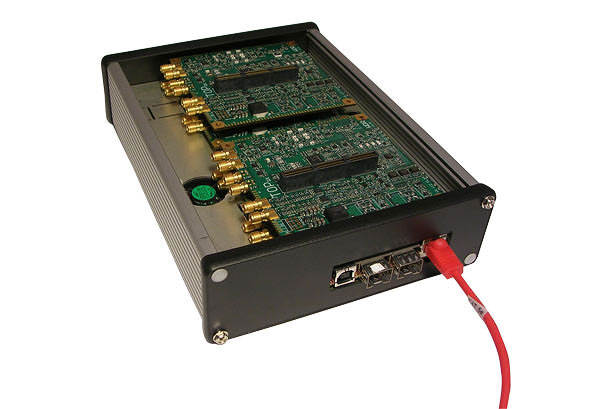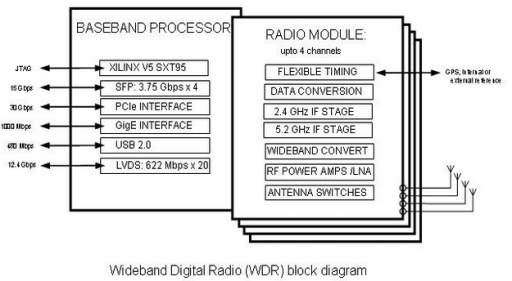‘Cognitive radio’ works across wide range of spectrum at high speeds
June 14, 2012

This cognitive radio can sense and rapidly switch between a wide range of frequencies at 400 Mbps (credit: Radio Technology Systems)
As KurzweilAI noted recently, a presidential advisory committee has urged President Obama to issue an executive order to adopt new “cognitive” or “agile” radio technologies to make better use of a huge swath of the radio spectrum now controlled by federal agencies.
The idea: instead of tying up a portion of the spectrum, cognitive radios would rapidly switch between frequencies that are unused at the moment.
Now Radio Technology Systems has come out with the fastest experimental cognitive radio yet, Technology Review reports: CogRadio works over a wide range of the radio spectrum — from 100 megahertz to 7.5 gigahertz — at 400 megabits per second.
Instead of tying up a portion of the spectrum, it can also sense available spectrum and switch between frequencies within at 50 microseconds, and in some cases as little as one microsecond.
“It’s the most usable and versatile wideband radio the research community has ever had access to,” says Dipankar Raychaudhuri, director of the Winlab, the wireless research lab at Rutgers University, where the technology was co-developed.

(Credit: Radio Technology Systems)
One of CogRadio’s jobs will be to serve as the test bed for the National Science Foundation’s research efforts to build a mobile-centric Internet, in which radio communications and smart phones are seen as the major delivery vehicle for Internet access, a project headquartered at Raychaudhuri’s lab.
CogRadio will also be used in one of the first outdoor tests of cognitive radios, underway at the University of Colorado, Boulder, where its software was developed. And researchers at Virginia Tech will use the gadgets to develop next-gen high-speed broadband police and fire and other emergency radios that include video and Internet access.
Bell Labs estimates that mobile data traffic will grow by a factor of 25 by 2016, and Cisco says it will grow 18-fold by that year. With the FCC making clear that existing spectrum will run out by next year, new technologies will be needed.
